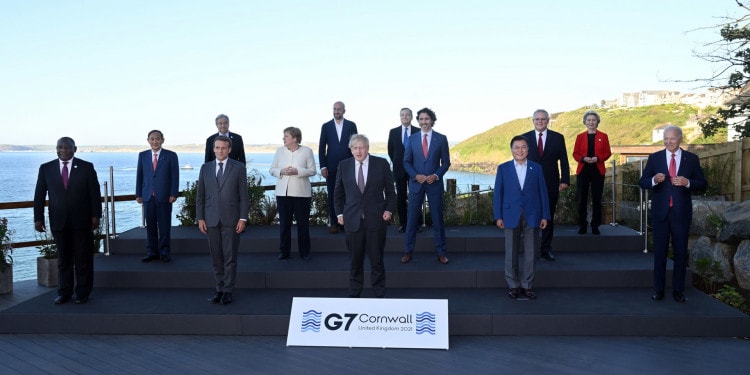Update 14 June, 8:30 pm: Just out, the communiqué from the NATO meeting in Brussels attended by President Biden. At the urging of the American President, the language is stronger than the one used by the G7 leaders that had criticised Beijing over human rights in its Xinjiang region, called for Hong Kong to keep a high degree of autonomy and demanded a full investigation of the origins of the coronavirus in China. What is remarkable is that the NATO communiqué for the first time since NATO was founded (in 1949) is concerned about China. In particular, it says that China’s “stated ambitions and assertive behaviour present systemic challenges to the rules-based international order” and is concerned about China’s “coercive policies” (a clear reference to the repression of the Uyghur Muslims in Xinjiang), the expansion of its nuclear arsenal and its “frequent lack of transparency and use of disinformation”. U.K. Prime Minister Boris Johnson was quick to underline that they didn’t want “a new cold war”.
The G7 Summit results have been something of a disappointment. I had wondered a few days ago whether the G7 Summit, facing the highest stakes ever, would deliver. We now are beginning to have the answer, and it’s disappointing, although a full picture of the international situation will need to wait for the results of the NATO meeting being held today and which President Biden is attending. Also important are the meetings Biden will hold with EU leaders tomorrow, in particular, the President of the European Commission Ursula von der Leyen and finally, on Wednesday in Geneva, with President Putin of Russia. Because, while not present at the meeting, China is in fact, the elephant in the room.
Let’s count the ways in which the G7 Summit results – as expressed in the final communiqué – came up short. Though, to be fair, there was some good news.
On public health, we can start with at least one big victory: The G7 came out with a strong endorsement of One Health as a key guiding principle to address future pandemics. This was the first time ever at such high political levels; and a major win for the concept of One Health.
Unfortunately, on the rest of the public health agenda, the G7 did not follow through, especially on the issue of vaccinating the world against COVID. One billion vaccine doses if offered are no doubt a step in the right direction but they are simply not going to be enough to address the issue and put an end to the pandemic.
Likewise, the G7 disappointed on the issue of climate change even though some important points were re-affirmed. Climate activists were angered by what they saw as more promises and few concrete commitments to fight climate change. This is because the final communiqué on Sunday moved away from earlier more ambitious drafts, abandoning the idea of “striving” to ensure that the majority of all new passenger car sales are not petrol or diesel-powered “by 2030 or sooner” and it failed to set an expiration date for burning coal, though they promised to cut collective emissions in half by 2030. Instead they focused on promoting zero-emission electric car production, writing:
“We recognize that this will require dramatically increasing the pace of the global decarbonization of the road transport sector throughout the 2020s, and beyond. We commit to accelerate the transition away from new sales of diesel and petrol cars to promote the uptake of zero-emission vehicles.”
The G7 leaders also reconfirmed the promise to release $100 billion annually in support of developing world efforts to cope with climate change transitions. It said the G-7 members will all increase their contributions but did not disclose by how much. U.K. Prime Minister Boris Johnson, who is hosting the COP26 UN climate summit in November in Glasgow, Scotland. noted that getting to $100 billion a year would not be “easy” but that he was confident the target would be met. Clearly, poor countries are going to be disappointed that “no new money” is on the table for them.
Also, even though UK Prime Minister Boris Johnson denied it, the meeting was marred by rising tension over Brexit and Johnson’s grumblings over the so-called “Northern Ireland protocol”. This is a complicated story that has its roots in the Irish question that has bedeviled the U.K. for now well over 100 years.
The said “protocol” is in fact an agreement reached with the EU over the post-Brexit status of Northern Ireland and it involves the creation of a “trade barrier” not between Northern Ireland and Ireland (which is a member of the EU) but in the Irish sea between Northern Ireland and the U.K. This barrier has disrupted supermarket supply chains and unsurprisingly, given the only history of Irish violence, it has stirred violent protests among Northern Ireland’s pro-U.K supporters. Expectations are that the dispute over Northern Ireland is set to come to a head at the end of this month when a grace period for chilled meats is due to expire.
However, Biden has taken a strong conciliatory approach, expressing support for the EU (unlike Trump) and a wish to see the issue resolved.
But all issues were overshadowed by an overriding concern over China and, to a minor extent Russia, particularly as China and Russia (despite repeated problems in their relations throughout the 20th century) have recently moved closer together and cooperate on a range of trade and political issues.
China, of course, was not part of the G7 Summit which is limited to the seven developed democracies of the world: Hosted this year by the UK in Cornwall, it was attended by the leaders of the U.S., Canada, France, Germany, Italy and Japan. Australia, India, South Korea and South Africa were invited as guest countries to this year’s Summit. China will however be at the coming G20 meeting to be held in Rome on 30-31 October, under the Italian presidency. Thus, the G7 Summit is a way for the advanced liberal democracies to get their act together and ready for the G20.
But getting their act together won’t be easy as G7 leaders tend to have different views on China’s rise as a superpower. For the United States, China is definitely a threat, and one that manifests itself on a range of issues, from AI to the web and human rights. For others, China is seen more as an investment and trade opportunity – although the EU and most European leaders in liberal democracies are aware of the threats posed by China. Likewise, they are aware that Russia poses a series of threats, from its support of Lukashenko, the dictator of Bielorussia when he highjacks a RyanAir plane and kidnaps an opponent or the Ukraine border disputes or the mistreatment of Navalny, Putin’s opponent.
Hence the importance of the follow-up meetings this week, with Biden at NATO and his meetings with EU leaders and Putin.
There is no question, however, that the G7 Summit marks the return of the United States on the international scene, and is a personal win for President Biden. Biden is likely to be a major influence, and he could change the course of action in many areas – including in such a sensitive matter as the spat between the EU and the U.K. over the Northern Ireland protocol. There is, for example, talk that the U.S. may be prepared to negotiate a trade deal with the U.K. even if Britain aligns food standards with the EU, which would reduce the need for checks between Northern Ireland and the British mainland.
In short, we may look forward to more agreements in the future between the U.S. and Europe. All to be further confirmed this coming October at the G20 meeting in Rome.
EDITOR’S NOTE: The opinions expressed here by Impakter.com columnists are their own, not those of Impakter.com. Featured image: United Kingdom Prime Minister Boris Johnson poses with the world leaders at the extended family photocall during the G7 Summit at Carbis Bay hotel in Cornwall, UK on 12th June 2021. Source: UK Government. Photo by ©Karwai Tang/G7 Cornwall 2021









